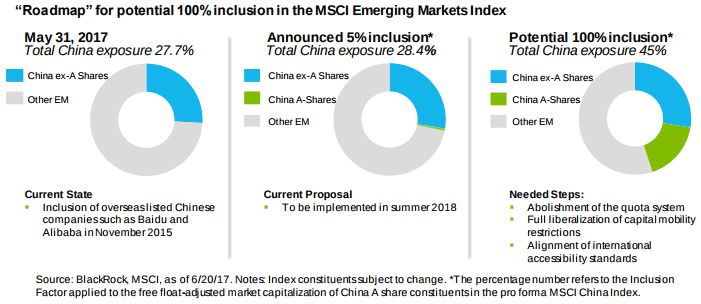If you knew what goes on behind the scenes of an index you’d understand why the “passive” label misrepresents index funds. Most indexes are actively managed, meaning the index fund counterpart is too.
I’ve highlighted this in the past with the S&P 500 and MSCI’s indexes. S&P adds and removes stocks from the index every year. So the S&P 500 today looks different than it did ten years ago. It’ll look different 10 years from now.
MSCI reviews and reclassifies countries often (the reviews are an annual event). So countries get moved from frontier to emerging market or emerging market to developed market indexes or vice versa (stocks are added to and removed from each index as well).
When these moves happen, the index changes, and so do the funds tracking the index. It happened when MSCI downgraded Greece (2013), upgraded Pakistan (2017), and others.
The latest is the MSCI addition of China’s A shares to the emerging market index that was announced this week:
MSCI announced on June 20, 2017 that it will include 222 China A Large Cap shares in the MSCI Emerging Markets Index using a 2-step inclusion process. The first inclusion step would coincide with the May 2018 Semi-Annual Index Review followed by the second step which would take place as part of the August 2018 Quarterly Index review.
MSCI has a powerpoint pdf with additional details. iShares also whipped up a quick summary of the EM index weighting looks like today compared to MSCI’s roadmap starting May 2018 and then beyond.

The simplified version is that adding the China A shares changes the weighting of the MSCI Emerging Market index (and a few others). The change won’t be that dramatic at first, but when it hits 100% inclusion, investors will have more exposure to China than compared to today.
(Sidenote: I’d expect the typical index front running – buying stocks before they’re added to an index – on this. The goal is to profit off the future increased demand for these shares. The roadmap may limit the impact to index funds owners.)
The lesson is in all this is simple. You should know what you own. Changes in an underlying index are fine so long as you know its happening. A regular check for index fund changes will help avoid any conflict or overlap in your portfolio.
Source:
China A: MSCI Inclusion Decision – iShares
Last Call
- Has the Rise of Passive Investing Generated the “Greatest Bubble Ever”? – 13D Research
- The Everything Bubble – Mauldin Economics
- Home Bias Blues: Investors Really Should Get Out More – B. Johnson
- How to Get Really Rich – J. Rekenthaler
- 5 Reason It’s Hard to Think Like a Scientist – Research Digest
- When Knowledge is Useless – A Wealth of Common Sense
- All Models Are Wrong – Farnam Street
- Amazon’s New Customer – Stratechery
- The Genius of Jeff Bezos – Intelligent Fanatics
- Cracking the Biggest Art Heist in History – Bloomberg
